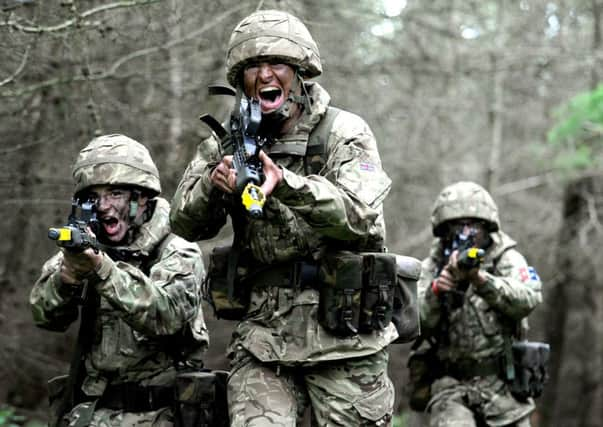Army regiments to be moved as part of major restructure


The Royal Scots Borderers (1 SCOTS) is set to leave its current base in Belfast and move to Aldershot by 2019, as part of new specialised infantry battalions.
Defence Secretary Sir Michael Fallon made the announcement on Thursday, as part of the ongoing Army 2020 restructure to modernise the British force.
Advertisement
Hide AdAdvertisement
Hide AdThere was anger north of the border about further changes to the military - just weeks after the Ministry of Defence’s better estate review confirmed closures of bases such as Fort George and Glencorse.
The Scottish Government’s veterans minister, Keith Brown, said: “I am particularly disappointed to learn that 1 SCOTS, the Royal Scots Borderers, will reduce in size and will transfer to Aldershot.
“1 SCOTS were uprooted from Scotland in 2014 and two years later, it is confirmed that they will be on the move again by 2019.
“This upheaval is extremely disruptive to families, especially children of school age, and it runs contrary to promises to assist personnel to put down settled roots.
“It is unclear how long this move will last - if it is intended to be permanent, it is a great pity that 1 SCOTS have not returned to a base in Scotland, close to their traditional recruiting ground and wider family support networks.”
Mr Brown said the Royal Regiment of Scotland had been “decimated by successive cuts”, as well as raising concerns about two Edinburgh-based reserve units.
A number of Royal Logistic Corps and Royal Electrical and Mechanical Engineer units will be reallocated to support the new strike brigades.
Mr Brown also paid tribute to the 3 Rifles, who he said will leave Dreghorn Barracks in Edinburgh in 2021.
Advertisement
Hide AdAdvertisement
Hide AdRegiments will be leaving their current bases in Windsor and Northern Ireland to join new strike and specialised infantry units, which should be formed by 2020.
The Household Cavalry Regiment will leave Combermere Barracks in Windsor to join a new strike brigade operating out of Catterick and Salisbury Plain, based around the new Ajax armoured vehicle.
They will be replaced in Windsor by the 1st Battalion Welsh Guards.
In a written statement to Parliament, Sir Michael said a more modernised division would be created around the 3rd (UK) Division, the UK’s only division at continual operational readiness.
This will consist of two armoured infantry and two strike brigades, rather than the three armoured infantry brigades it is currently made up of.
One of each will be held at high readiness, added Sir Michael.
To help this, a new strike experimentation group will be established in Warminster next year, with the first new strike group to be formed by the end of the decade.
In addition to this, two new specialised infantry battalions will be created.
Advertisement
Hide AdAdvertisement
Hide AdA new group headquarters for the units will be established, initially based in York alongside the 1st (UK) Division, of which the group will be part, before moving to Aldershot by 2020.
Two further infantry battalions, the 2nd Battalion The Princess of Wales’s Royal Regiment and the 2nd Battalion The Duke of Lancaster’s Regiment, will join the group at Aldershot by 2020.
Sir Michael added that as part of the Army’s renewed focus on reserves, two new reserve infantry battalions will be created from 2017, the 4th Battalion The Princess of Wales’s Royal Regiment and 8th Battalion The Rifles.
A new reserve explosive ordnance disposal (EOD) regiment will also be created.
Sir Michael said: “As we previously committed, we will continue to sustain a regular Army of 82,000, a whole force of 112,000 regular and reserve troops and the Army’s footprint in the devolved nations.
“All existing regimental cap badges will be retained.
“Large parts of the Army will be unaffected, but it will involve some units changing their role, equipment or location.”